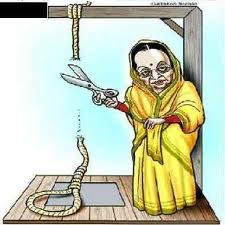 New Delhi, June 22: Ahead of demitting office, President Pratibha Patil has scored a new record. She has commuted the death sentence of as many as 35 convicts to life — among them are those convicted of mass murder, kidnapping, rape and killing of children.
New Delhi, June 22: Ahead of demitting office, President Pratibha Patil has scored a new record. She has commuted the death sentence of as many as 35 convicts to life — among them are those convicted of mass murder, kidnapping, rape and killing of children.
On June 2, Patil gave her pardon to four more — Bandu Baburao Tidke from Karnataka, Buntu from Uttar Pradesh and Lalchand alias Laliya Dhoom and Shiv Lal from Rajasthan. As a swami of Sadashiva Appana Math, Bagalkot, Tidke abducted a 16-year-old schoolgirl, raped and murdered her. UP's Bantu, on death row since July 2008, was convicted of raping and killing a five-year-old girl.
In fact, almost all the convicts pardoned are guilty of the most blood-curdling crimes. Piara Singh, Sarabjit Singh, Gurdev Singh and Satnam Singh had massacred 17 of a family at a marriage function. Gopi and Mohan (Tamil Nadu) and Molai Ram and Santosh (Madhya Pradesh) had raped and murdered little girls.
The large scale of presidential pardons is seen as surprising. That is because India has not yet abolished the death penalty.
Were these pardons diluting the legal provision through the backdoor? Archana Dutta, Rashtrapati Bhavan spokesperson, said the President was well aware of constitutional provisions as she was a lawyer herself. "The President only takes a decision to commute a death sentence or reject it after she is satisfied by the advice tendered by the government. The President ensures that the government has put in certain application of mind to give mitigating and extenuating circumstances for their advice,'' she said.
Notwithstanding Dutta's assertion, the speed with which Patil has granted pardons would indicate haste. Those shown clemency have been held guilty of barbaric crimes. These appear to have met the criterion of the "rarest of the rare" crimes that attract death penalty. While Patil has shown mercy to mass killers and rapists and killers of children, she has not given the same treatment to political assassins like the killers of former Punjab chief minister Beant Singh or Rajiv Gandhi.
With the June 2 decision to grant four more pardons, the President boasts of a disposal rate of 200%. In recent times President K R Narayanan received 10 petitions and disposed of only one in his tenure. A P J Abdul Kalam inherited nine petitions with another 16 added in his term, taking the total to 25. He disposed of only two — rejecting one and pardoning the other.
Presidential pardon
Article 72 empowers President to pardon, grant reprieve or suspend, remit, commute sentence of person convicted of any offence
President guided by home minister, council of ministers
Exercise of the executive prerogative subject to judicial review
Pratibha Patil has granted clemency to 35 convicts — a record 22 of those killed by these 35 were women and children
Patil rejected 3 pleas
Afzal Guru's among pending mercy petitions
Since 1981, more than 90 have pleaded for clemency
Patil's disposal rate is about 200% unlike K R Narayanan who only disposed of one petition of the 10 he received and Kalam who had a disposal rate of 12.5%
Clemency call
APJ Abdul Kalam | Had 25 mercy petitions. Rejected plea of Dhananjoy Chatterjee, India's last recorded execution. Commuted one to life. Returned others
K R Narayanan | Sat on all pleas. Used delay as tactic. Received about 10 mercy pleas
S D Sharma | Rejected all 14 mercy petitions presented to him
Some sentences commuted
SATISH | Killed & brutalized Visakha, 6, a UP resident, in 2001
MOLAI RAM & SANTOSH YADAV | Raped and killed 10-yr-old daughter of jailor in MP prison in 1996
DHARMENDRA SINGH and NARENDRA YADAV | UP duo killed couple and their 3 minor kids in 1994
PIARA SINGH and HIS THREE SONS| From Punjab, massacred 17 of a wedding party
SHOBHIT CHAMAR | Of Bihar. Jailed for killing 6 of an upper caste landlord's family, including 2 kids
R GOVINDSWAMY | From Kerala, sentenced for murder of his paternal uncle, aunt, their three children over a land dispute
SHYAM MANOHAR, SHEO RAM, PRAKASH, RAVINDER SURESH and HARISH | Killed five, including a 10-yr-old boy, over a property dispute
OM PRAKASH | From Uttarakhand, murdered retired brigadier and two family members
SUSHIL MURMU | Sacrificed a 9-yr-old boy in Jharkhand for his own prosperity
MOHAN and GOPI | From TN, kidnapped 10-yr-old boy, strangled him, got Rs 5 lakh as ransom
JAIKUMAR | Murdered pregnant sister-in-law and niece





Comments
Add new comment